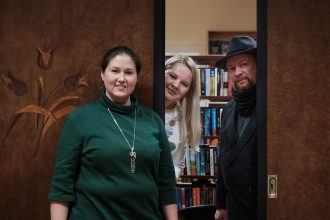The history of the Duchess Birutė Association of Women from Officers’ Families (Birutietės) began in the interwar period. At that time, the organization consisted of over 600 women, who were united not only due to their connection to the military but also because of their sincere desire to help others, foster patriotism and work on building a young state.
The association that was reborn after the restoration of independence, continues to nurture these values and rallies up active women not only in Vilnius and Kaunas, but also in five other Lithuanian cities. We talked about Birutietės’ work with Asta Reklaitytė, whose mother headed the Duchess Birutė Association of Šiauliai during the interwar period. The interviewee herself is part of the organization’s branch in Kaunas for many years.

Asta’s stories about her family’s fate and ties with the army could become a separate article. Her father, whose portrait hangs on the living room wall, was the commander of the Gediminas Regiment in Ukmergė. Later, during the rotation, the whole family moved to Šiauliai where he served as the commander of the Third Infantry Division. Asta’s father’s brothers and cousins were also officers, military doctors and colonels. Her mother supported the military as one of the members of Birutietės in Šiauliai. True, Asta says that she heard few stories about the organization in her childhood, “At the beginning of independence, those were not easy topics, and later, life took a completely different turn.” The drastic turn that the woman mentions is the beginning of the Second World War and the first Soviet occupation. Asta’s father was dismissed from the service, later arrested, and the occupying forces deported the rest of the family to Siberia. Asta says she doesn’t know whether it happened because of her father’s high rank in the military, “Who can say now what those reasons were? It was an empire of lies, which continues to manifest today. Not only my mother and sister, but also my grandparents and aunt’s family found themselves in exile.” My interviewee returned from exile with her mother and sister after seventeen years, leaving behind four graves in Tomsk region, Siberia.


Keepers of history
Kaunas resident says that the restoration of the organization was initiated by pre-war officers’ wives, the first Birutietės. For them, this revival of the association was extremely important, so they started looking for each other, previous members and daughters of the men who served during the interwar period. Thus, with the help of word of mouth, members of today’s association started coming together. “At that time, we were all looking for something. I found out about the restored organization quite by accident. In 1990, I broke my arm and was going to the clinic for physiotherapy. A woman approached me and asked whether I had any connections with the military. I learned from her that the association was being restored. I personally knew quite a few officers’ daughters, including my cousin and a former colleague. That is how we were building the association – from mutual acquaintances, accidentally discovered connections and great desire,” Asta recalls.
The interviewee, who welcomed me in her home says that today it is the duty of the older members of the association to welcome young members and help them integrate, introduce them to the organization’s history, work, and traditions. 1922 can be considered the beginning of the association, when Lieutenant Vladas Nagevičius founded the Women’s Committee for the Care of Soldiers, Sick and Disabled, that brought the wives of military medics together. It was later decided to invite other officers’ wives. Thus, three years later, the Association of Women from Officers’ Families was founded. Many teachers and other educated women worked in it. In March 1935, the organization named itself after the Grand Duchess Birutė of Lithuania, commemorating the 550th anniversary of her death. The flag of the organization was created, separate sections of the organization were formed: pedagogical, medical, and cultural. In the interwar period, Birutietės established 20 kindergartens, several of which worked according to the Montessori program, organized charity events in the Lithuanian Garrison Officers’ Club where they collected funds for the weapons of serving men. “The country was getting back on its feet, everything was missing, people didn’t have many opportunities to get an education,” Asta explains what motivated the organization at that time. Unfortunately, the organization’s activities in Lithuania stopped during the Soviet occupation, but it is worth noting that the traditions were further developed by women who left for the West. A special Birutietės’ publication was published in the US, and the spirit of the association was maintained.
Sisters Birutietės
Now Birutietės Association consists of the wives and daughters of both currently serving and former military men. The Kaunas organization is also happy to welcome serving female officers to its ranks. Women who support the activities of the association but have no ties to the military can be supporters of the organization: attend meetings and activities.
When I ask what unites the members of the organization, apart from family status, I receive the answer: sincere patriotism and the desire to help and sympathize with another person. “The wives of officers find amity because they have similar experiences, they support each other when their husbands go on missions, face health problems, are injured or killed,” Asta says. During the meetings, members of the organization solve the most pressing issues and plan joint activities. However, the bond between the members does not stop there, “We are really close, we call each other sisters. Despite the age difference, we communicate directly, support each other, sympathize with and help each other. Sometimes it can be the simplest phone call to another member who is unable to leave home. Nobody demands it but you feel it in your heart and simply can’t help doing it.”

From marathons to pie day
In addition to the publicly invisible side of the organization, which I would like to call a woman-to-woman support system, members of the association also engage in social work. The society pays considerable attention to youth education. Every year, members of the association organize a camp for children from the families of serving soldiers. Asta is convinced that patriotic feelings should be nurtured since childhood because it is much more difficult to instill such a value in an adult, “If a child’s family and other people around him nurture national values, they take it on. I remember, after returning from exile, I felt that that Lithuanian air smelled good to me. It is difficult to express such a feeling; it comes from the values and memories instilled in childhood.”
Asta adds that the organization actively visits schools and organizes cultural events, however now, more attention is paid to charity. Previously, financial assistance was provided to the families of soldiers killed in missions, but after the pandemic and the start of the war in Ukraine, a larger number of people requires urgent support. Birutietės association initiated various campaigns to help Ukrainians and organized a charity campaign for the families of Afghan translators. In the spring of last year, the members of the association met with Diana Nausėdiėnė and the families of Ukrainians living in Lithuania in the Garrison Officers’ Club and prepared gifts for them to facilitate integration. “The world has shrunk considerably, everyone needs help. I think we shouldn’t forcibly enter the lives of these families, but we can offer to participate in activities, outings, communicate, and help when they need it,” Asta thinks.


The annual In Memoriam marathon has become a tradition for the members of the association. It is organized to honor the soldiers who died that year. The members also organize a Pie Day, during which financial support is collected for the families of officers in trouble; conferences in Palanga, Advent evenings, thanksgiving events, gift preparations for soldiers on missions and other initiatives area also organized. One of the most important celebrations for the association is Birutė’s name day on February 5. During this day the members from different cities gather at the Garrison Officers’ Club dressed in national costumes, where a ceremonial reception of new members takes place.
Traditionally, new members of the association carry a candle and repeat the words, “In the name of Birutė, I carry the holy fire.” Also, the society participates in the celebrations of all national holidays, commemorates the Lithuanian Armed Forces Day on November 23. The range of the organization’s initiatives is quite broad, so every member can find a nice way to get involved in common activities and foster the society’s values, “The epoch changes everything but the goal of the organization refined during the interwar period to promote Lithuanianness and respect for the army remains to this day. I have a lot of free time on my hands so I try to help whenever I can. All these activities provide real comfort for my soul.”




